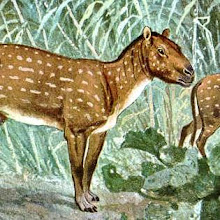
While I was checking for comments on the post "Beast" is not "Beast" , I noticed this comment: "Just to add a point. English words can often be used as not only adjectives and nouns, but also verbs without a change.
1.) I am swimming (swimming is the action or verb)
2.) He was a swimming champion (swimming, the adjective, describes champion, the noun)
3.) She is good at swimming (swimming, in this case, is an noun as it is being acted upon by the verb "is")
boom, roasted beast."
Commenter, you do have a point, some things can change parts of speech without modification, but the case you gave doesn't really work in the way I think you think it does.
The first example you gave is wrong. "Swimming" is not a verb, it is a gerund. Gerunds are used by placing "-ing" at the end of verbs to make them nouns. For some reason the English language decided that the plain form of the verb wasn't good enough for it and use a form of the verb "be" instead. So, "am" is the verb, not "swimming" and if it was, it would be "am swimming." If you want to get it in its pure form, you would say "I swim" and all of the examples I gave are modifications.
The second example is really hard to prove wrong. I will have to delve into German to prove you wrong. German and English are both of the Germanic branch and have similar grammar. You may object to me using German to justify a point about the English language, but all's fair in love, war, and grammar-related debates. By the way, if you're going to provide a counter-point, get your points from the Germanic Branch, not the Romance Branch or anything else. In German, you could say this two different ways. The first is with an adjective. Er war schwimmenden Meister. This could work as an adjective, even though it requires rewording in the German version, but this is not what you mean to say. This implies that the champion is currently swimming. You can argue against me, but this is what it seems like. You probably want the second way, making it a compound word. Er war Schwimmenmeister. This is what you want it to mean, but it makes it part of the word, it is a compound word, not an adjective. You can debate me all you want on this, but I think it is confusing, and potentially incorrect grammar. It would be best to say "He was a champion at swimming." That's another gerund, so you only have one case so far.
I have no reason to debate you on the third case. It seems grammatically correct and uses the gerund as a noun. So far you have proven that it can be used in one way, as a noun. So, if you are still not convinced that you should modify slang words to turn them into other parts of speech, I hope this helps.
By the way, if you are a native speaker of German, feel free to correct me. I am learning and don't know how to make compound words.
P.S. Sorry if you thought I was being rude, I became competitive.
Photo from here
A couple comments. First, I said German and English had similar grammar, not the same. Second, I will recant my claim on it not being an adjective, that would get into stuff that I'm not quite as well versed in. Third, Your adjective examples only have them placed in front of nouns, can you think of cases where they don't need a noun directly after them. Fourth, can you think of any adverbs that follow this rule. Finally, I said that most words need modification to change, there may be some exceptions, but I meant like "slow" to "slowly," "good" to "goodness," "boy" to "boyish". I'm not sure if your examples are as clear-cut as that. Anyway, do you really think that slang doesn't have to follow these rules? That was the original debate. Slang words are as much a part of the language as common words, whether people like it or not, they have to follow the rules too.

